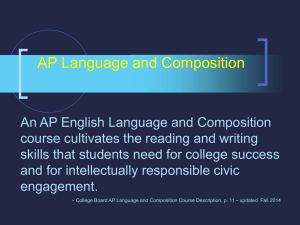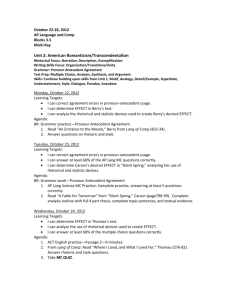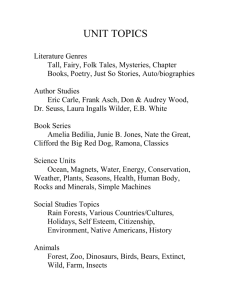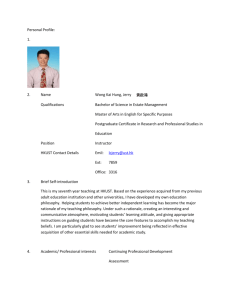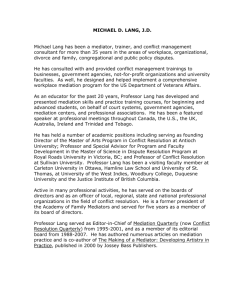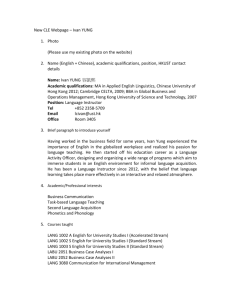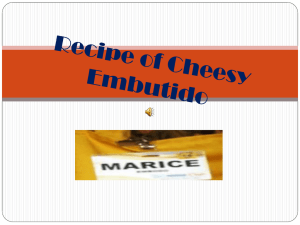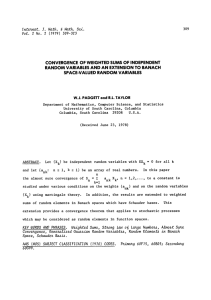AP- Lang Wk.2.1 EQ- Who wrote?
advertisement
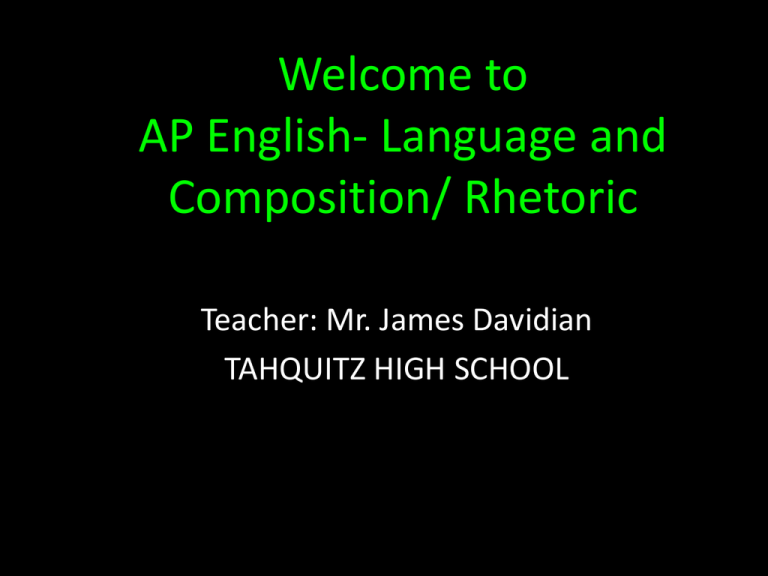
Welcome to AP English- Language and Composition/ Rhetoric Teacher: Mr. James Davidian TAHQUITZ HIGH SCHOOL AP English- Language and Composition/ Rhetoric day 1 Intro To Class- See DAY 1 POWERPOINT Handout= Class Expectations Thank you for entering Quietly, Prepared, Cell away, no gum Wk1.2 EQ? How do Writers persuade using Allegory personification? Please grab a handout &sit in your same seat as yesterday 1. Please TURN-IN your HW signed “Parent” slip into the folder. 2. Quick write-Please grab the handout and describe what cool things you did this summer. 3. Pick an animal you like, or one that rhymes with your name 4. Now retell your summer story using the animal as YOU (allegory). 5. Use Time transitions HW- write these transitions 2x each WE WILL GET TEXTBOOKS FRIDAYBring your ID card! Thank you for entering Quietly, Prepared, Cell away, no gum AP LANG Wk1.3 EQ? How does historical context affect arguments? 1. Turn in HW 2. Please copy these transitions on the back of your handout. For example, For instance, For one, In Fact, Specifically, Another example.. One way One such case was… One thing that illustrates Also, Additionally, Furthermore, Moreover, By the same token, Equally In the same way, Likewise, Similarly, In addition to_,… Besides __,… Not only is_ _,but Lastly, Finally Thank you for entering Quietly, Prepared, Cell away, no gum Wk1.3 EQ? How does historical context affect arguments? 3. Decorate your Notebook/ front page “IT’s not where you’re from, it’s where you are going.” “You are who you plan to be” “It is not how you start it is how you finish.” Thank you for entering Quietly, Prepared, Cell away, no gum Wk1.3 EQ? How does historical context affect arguments? LO. Literary Periods -Medieval /Middle –Greece, Rome, Theology with secular -Renaissance -Arts, Michelangelo, Mona Lisa, Shakespeare- 15th-17 -Enlightenment -1700’s - Age of reason, Europe, individual,; Aristocratic Rev War 1775 Dec Ind- 1776 -Romanticism- 1798-1870 - Love for nature, emotion/imagery, creativity, self express; Darkness in nature, nationalism -Transcendental- 1830-1860’s- American revolt- against, absolutism, eliminate artificial, explain God, felt miracle of Creation, gain (absolute) truth through nature -Victorian- 1837-1901 - Romantic, Poetic, Beauty, manners, novels of ideals of hard work, protagonist, traditions CW- 1865 Thank you for entering Quietly, Prepared, Cell away, no gum Wk1.3 EQ? How does historical context affect arguments? Finish notes on -Literary Periods pt.2 -Naturalism 1870-1920- more scholarly/natural evidence, ; Darwin, Crane Realism 1820-1920’s-rejected Romanticism; focused on reality, dark truth, accuracy, tragedy, especially caused by Industrial Rev Existentialism 1850-today- What you experience is trueself most important; no absolute truth WW1- 1917-1919 WW2- 1941-1945 Modernism (1920-1965) American Dream Post Modernism- 1900-today Industrial, Pop-Culture, Tout Education, new age ideas, not tradition, or morals. Korea -1950-53 Self centered culture Vietnam- 1964-73 Contemporary - Today less spiritual • PRESENT AUTOBIOGRAPHY –LIBRARY- Gulf 190-1991 War everywhere 2001 • HW read pg 1-3, Gehrig’s speech AP LANG Wk 1.5 EQ “What is in an Argument?” FINISH PRESENTATIONS Read 4-6 EHTOS PATHOS LOGOS HW- Find a Rhetorical Cartoon (something with ETHOS PATHOS LOGOS) AP LANG Wk1.5 Intro to EPL- pg 4-6 AP- Lang Wk 2.1 What Rhetorical Devices are used in Arguments? Please copy these 60 Terms onto your handout 13. Aporia 1. Allegory 14. Aphorism 2. Alliteration 15. Appeal E.P.L 3. Allusion 16 Assonance 4. Ambiguity 17 Asyndeton 5. Amplification 18 Cacophony 6. Anadiplosis 7. Analogy/ Anecdote 19 Caesura 20 Cliché 8. Anaphora 21 Consonance 9. Anastrophe 10. Antimetabole (Chiasmus) 22 Enjambment 23 Enumeration 11. Antithesis 24 Epanalepsis 12. Apostrophe *HW- Read/Watch MLK “I Have A Dream” AP- Lang Wk 2.1 What Rhetorical Devices are used in Arguments? #25 -60 Epistrophe Epithet Eponym Euphemism Flashback Foreshadowing Hyperbole Hypophora Irony Idiom Imagery Juxtaposition Metabasis Metaphor Stream of Motif Consciousness Neologism Symbolism Onomatopoeia Synychdote Oxymoron Simile Paradox UnderstateParallelism ment Parenthesis Zeugma Personification Pleonasm Polysyndeton Procatalepsis Pun Repetition Rhetorical Question Satire Scesis Onomaton“skee- AP- Lang Wk 2.1 What Rhetorical Devices are used in arguments? LO. Remember ACRONYM for all Rhetorical devices Write these down in this exact order: ACE FHI MOP RSU 1 2 3 2 Now flip your page over and write them again AP- Lang & Comp- Wk 1.5 LO. Remember ACRONYM for all Rhetorical devices You should of written -. Next, we’ll add MORE. Flip over. Repeat. ACE FHI MOP RSU 1 7-4-7 2 23 3 28 26 1 7-4-7 2 23 1 31 28 2 6 11 ACE FHI j MnOP RS uz Now flip your page over and write them again *HW- Read/Watch MLK “I Have A Dream” AP- Lang & Comp- Wk 2.1 .ACE=17-4-7 = A=17 AL AM ANA ANTI AP AS 3 2 4 2 4 2 AP- Lang Wk 2.1 What 1. TO Explain Facts/Feelings Communicate Characterize Convey Clarify Communicate Depict Describe Express Explain Expound Reveal Show EFFECTS do Rhetorical Devices have? Illuminate Illustrate Paint a pic Point out Summarize Specify Compare Depict Distinguish_ from _ Equate _ with_ Contrast Differentiate Symbolize To Hint Evoke Imply Indicate Make clear that— Suggest _ a subtle indication Shift 2. Entertain Amuse Create irony Create humor Satirizes Make it _ AP- Lang Wk 2.1 What 3. TO Add Suspense, drama, excitement Enhance Augment_ Create__ (Irony) Enrich__ Heighten__ Improve__ Make it …_exciting EFFECTS do Rhetorical Devices have? 4. Emphasize Amplify Exaggerate Highlight Intensify Minimize Diminish Reinforce Reiterate Strengthen 5. Persuade Argue Challenge Convince Justify Defend Stress Insist Ridicule Mock Disprove Refute Repudiate Rebut 6. Make us think Challenge Encourage Elicit Evoke Provoke Stimulate Suggest Instruct Teach Motivate Inspire AP LANG Wk2.1 EQ “How do I Read, Think, Discuss, Write AP essays?” How to read, take notes, & prepare for writing Analyze - What they said, How, & WhY (effect) 1. For HandoutsAnnotate Everything See ch.2 pg 48-51 If you know how to Draw, you know how to read *This is the main Skill you will use On the AP Test *Except you will have 2-4 mintutes to do it! AP LANG Wk 2.1 EQ “How do I Read, Think, Discuss, Write AP essays?” How to read, take notes, & prepare for writing Analyze -What they said, How, & WhY (effect) 2. For the Textbook/Novels- Graphic Organizer Journal- (pg 52-55) -Pg. “Title” by Author (1776) Essay- 1-2 per paragraph. Novel- 1 every page. Pg 52 “Main Quotes...” P.1 Summarize Why/EFFECT? (analogy) Effect verb (simile) Effect verb p.3 “quote” and “quote” AP LANG Wk 2.1 EQ “How do I Read, Think, Discuss, Write AP essays?” How to read, take notes, & prepare for writing 3. COPY Essays/Quotes (Cornel Note style) The Declaration of Independence: July 4, 1776. When in the Course of human events, it becomes Questions necessary for one people to dissolve the political bands which have connected them with another, and to Notes assume among the powers of the earth, the separate Refection and equal station to which the Laws of Nature and of Annotation Nature's God entitle them, a decent respect to the opinions of mankind requires that they should declare the causes which impel them to the separation. We hold these truths to be self-evident, that all men are created equal, that they are endowed by their Creator with certain unalienable Rights, that among these are Life, Liberty and the pursuit of Happiness.--That to secure these rights, Governments are instituted among Men, deriving their just powers from the consent of the governed, --That whenever any Form of Government becomes destructive of these ends, it is the Right of the People to alter or to abolish it, and to institute new Government, laying its foundation on such principles and organizing its powers in such form, as to them shall seem most likely to effect their Safety and Happiness. AP LANG Wk 2.1 EQ “How do I Read, Think, Discuss, Write AP essays?” How to read, take notes, & prepare for writing 4. Ask/Write Questions as you read (pg 44-47) #Questions- 1-2 per paragraph. Novel- 1 every page. -Pg. “Title” by Author 1. What were the “Unalienable rights?” 2. Why is “Creator” capitalized? 3. How does the Creator give these rights? *HW- Read/Watch MLK “I Have A Dream” AP LANG Wk 2.2 EQ “How do I Read, Think, Discuss, Write AP essays?” Warm-up- Please COPY The response from A. Einstein Albert Einstein’s response to Phyllis: Jan 24, 1936. (pg.9) Dear Phyllis, I will attempt to reply to your question as simply as I can. Questions Here is my answer: Notes Scientists believe that every occurrence, including the Refection affairs of human beings, is due to the laws of nature. Annotation Therefore a scientist cannot be inclined to believe that the course of events can be influenced by prayer, that is, by a supernaturally manifested wish. Balance However, we must concede that our actual knowledge of Concede these forces is imperfect, so that in the end the belief in the existence of a final, ultimate spirit rests on a kind of faith. Such belief remains widespread even with the current achievements in science. E. P. L But also, everyone who is seriously involved in the pursuit of science becomes convinced that some spirit is manifest in the laws of the universe, one that is vastly superior to that of man. In this way the pursuit of science leads to a religious feeling of a special sort, which is surely quite different from the religiosity of someone more naive. With cordial greetings, Your A. Einstein AP LANG Wk 2.1 EQ “How do I Read, Think, Discuss, Write AP essays?” -discuss balance in argument Read Einstein’s Letter pg 9 HW- Find a Rhetorical Cartoon (something with ETHOS PATHOS LOGOS) AP- Lang Wk.2.1 EQ- Who wrote? When? AP- Lang Wk.2.1 EQ- Who wrote? When? AP- Lang & Comp- Wk 1.2 EQ- Who wrote? When? AP- Lang & Comp- Wk 31.3 AP- LANG- Wk 1.2- EQ- Who wrote? When? AP- LANG- Wk 1.2- EQ- Who wrote? When? AP- LANG- Wk 1.2- EQ- Who wrote? When? AP- LANG- Wk 1.2- EQ- Who wrote? When? AP- LANG- Wk 1.2- EQ- Who wrote? When? AP- LANG- Wk 1.2- EQ- Who wrote? When? AP- Lang & Comp- Wk 31.3 AP- Lang & Comp- Wk 31.3 AP- LANG- Wk 1.2- EQ- Who wrote? When? AP- LANG- Wk 1.2- EQ- Who wrote? When? AP- LANG- Wk 1.2- EQ- Who wrote? When? AP- LANG- Wk 1.2- EQ- Who wrote? When?
